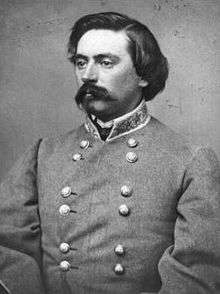Pierce M. B. Young
| Pierce Manning Butler Young | |
|---|---|
 | |
| Born |
November 15, 1836 Spartanburg, South Carolina |
| Died |
July 6, 1896 (aged 59) New York City |
| Allegiance |
|
| Service/branch |
|
| Years of service | 1861–1865 |
| Rank |
|
| Commands held |
Young's Cavalry Division Young's Cavalry Brigade Cobb's Legion |
| Battles/wars | |
| Other work | U.S. Congressman |
Pierce Manning Butler Young (November 15, 1836 – July 6, 1896) was a Major General in the Confederate States Army during the American Civil War and a post-war politician, diplomat, and four-term United States Congressman from Georgia.
Early life and career
Young was born at Spartanburg, South Carolina. His father, Dr. R. M. Young, was a son of Capt. William Young, a soldier in the American Revolution under George Washington. When Pierce was a small boy, his father moved to Bartow County, Georgia, and enlisted private tutors for his children. At the age of thirteen, Young entered the Georgia Military Institute in Marietta, and graduated in 1856. He subsequently briefly studied law. In 1857, he was appointed to the United States Military Academy, but resigned only two months before graduation due to Georgia's secession.
Civil War
Returning home in early 1861, he was appointed Second Lieutenant in the 1st Georgia Infantry regiment, but declined that commission for the same rank in the artillery. In July, he was promoted to First Lieutenant and was attached to the staff of General Braxton Bragg at Pensacola, Florida. He was at the same time aide-de-camp to Gen. W. H. T. Walker. In July, Young was appointed adjutant of the Georgia Legion, better known as Cobb's Legion, and was promoted to Major in September and to Lieutenant Colonel in November, commanding the cavalry portion of the legion.
Young's cavalry was attached to Wade Hampton's brigade of J.E.B. Stuart's cavalry division in the Army of Northern Virginia in 1862. He was distinguished for "remarkable gallantry," as Stuart expressed it, in the Maryland Campaign. Promoted to Colonel, he rendered brilliant service at the Battle of Brandy Station and participated in the cavalry operations of the Gettysburg Campaign. In early August, he was wounded in another fight near Brandy Station. In October, he was promoted to Brigadier General and assigned command of Hampton's old brigade, consisting of the 1st and 2nd South Carolina cavalry regiments, the Cobb Legion, Jeff Davis Legion and Phillips' Legion. He was actively engaged during the Bristoe and Mine Run Campaigns, where on October 12, 1863, by adroit maneuvering, he compelled an enemy division to recross the Rappahannock River. An admiring Stuart reported, "The defeat of an expedition which might have proved so embarrassing entitles the officers who effected it to the award of distinguished skill and generalship."
In 1864, Young played a prominent part in the Overland Campaign in Virginia, and when Hampton assumed command of the cavalry after Stuart's death at Yellow Tavern, he temporarily took Hampton's place as division commander. In November, Young was sent to Augusta to gather reinforcements and aid in the defense of that city, threatened by William T. Sherman. Promoted to Major General in December, he was actively engaged in the defense of Savannah and the 1865 campaign in the Carolinas under General Hampton until the close of the war.
Postbellum career
After the war, he returned to Georgia, and lived as a planter. He was elected to the US House of Representatives for four terms (1868-1875), served as consul-general at St. Petersburg, Russia (1885–87) and was US minister to Guatemala and Honduras (1893-1896). Young died on July 6, 1896, in New York City.
See also
References
- Eicher, John H., and David J. Eicher, Civil War High Commands. Stanford: Stanford University Press, 2001. ISBN 978-0-8047-3641-1.
- Evans, Clement A., ed. Confederate Military History: A Library of Confederate States History. 12 vols. Atlanta: Confederate Publishing Company, 1899. OCLC 833588. Retrieved January 20, 2011. Volume: 6. Derry, J. T.; Georgia.
- Holland, Lynwood Mathis. "Pierce M.B. Young: The Warwick of the South". Athens, GA: The University of Georgia Press, 1964. OCLC 1382650
- Sifakis, Stewart. Who Was Who in the Civil War. New York: Facts On File, 1988. ISBN 978-0-8160-1055-4.
- Warner, Ezra J. Generals in Gray: Lives of the Confederate Commanders. Baton Rouge: Louisiana State University Press, 1959. ISBN 978-0-8071-0823-9.
- United States Congress. "Pierce M. B. Young (id: Y000048)". Biographical Directory of the United States Congress. Retrieved on 2008-02-13
- Pierce M. B. Young at The Political Graveyard
External links
- Pierce Manning Butler Young historical marker
| U.S. House of Representatives | ||
|---|---|---|
| Preceded by American Civil War |
Member of the U.S. House of Representatives from Georgia's 7th congressional district July 25, 1868 - March 3, 1869 |
Succeeded by Reclaimed seat |
| Preceded by Self, seat vacated |
Member of the U.S. House of Representatives from Georgia's 7th congressional district December 22, 1870 - March 3, 1875 |
Succeeded by William H. Felton |
| Diplomatic posts | ||
| Preceded by Romualdo Pacheco |
United States Minister to Guatemala June 12, 1893–May 23, 1896 |
Succeeded by Macgrane Coxe |
| United States Minister to Honduras November 12, 1893–May 23, 1896 | ||